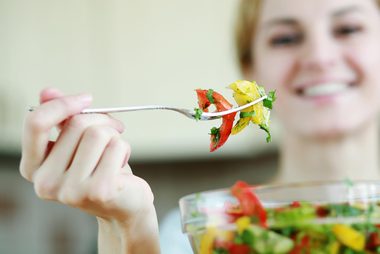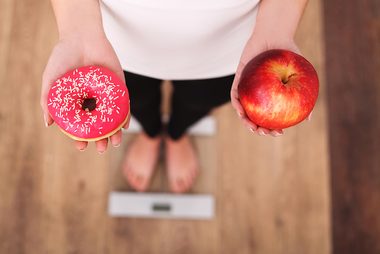
Letting negativity rule
The glass-half-empty mindset can be hard on your heart, but it also drives poor eating habits, says registered dietitian Kaleigh McMordie. Weight-loss advertising is particularly good at preying on the negative thinking habits that many people develop toward food, McMordie says. “The whole dieting industry is designed to play off of making people feel bad about their bodies and themselves,” McMordie explains, “making them think they need to spend all of this money on a diet plan that doesn’t work. When the diet fails that person, they feel worse about themselves, and the cycle continues. People often blame themselves, when in reality, it is the diet that fails, not the person. Until people break out of the diet mentality, it is hard to appreciate the body, no matter what size, for all that it does.”

Anxiety fuels your needs
Ever have a big presentation coming up or you’re about to have a difficult conversation with someone you love? You should try to manage your stress or you might find yourself reaching for second (or ahem, third) helpings of your dinner or favorite snack. Often referred to as stress eating, this type of behavior is induced by anxiety and unless addressed, can be detrimental to that scale—both up and down. “Anxiety can absolutely affect the diet. Anxiety manifests differently in individuals. Some people may find themselves needing to control every ounce of food they eat, others may feel the urge to overeat, and others may lose their appetite altogether,” McMordie says. Try these 7 strategies to stop emotional eating.
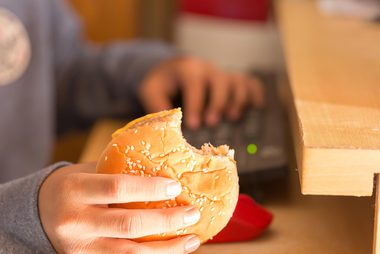
Depression drives eating
Thought patterns that drive overeating can be subtle, but depression is an obvious path to food troubles. An analysis of depression and obesity published in the Archives of General Psychiatry revealed that the mood disorder is indelibly linked to weight gain. Keith Ayoob, registered dietitian and associate professor at the Albert Einstein College of Medicine, explains that with depression, your food mood and perspective will change dramatically. Feelings of depression could show up in binge eating or starvation, but what’s key is to address your feelings head-on. “It’s so important to recognize what’s going on and seek appropriate help so you can take steps to not let depression impact your health and weight,” he says.

Stress sabotages weight-loss goals
Life is crazy, and when you’re watching calories, forcing yourself to go to the gym and resisting those 11 a.m. cravings, you can feel even more stressed than normal. And a stressed brain can subtly undermine your efforts. McMordie says that “when people feel insecure about their bodies or eating habits, they may overly restrict the types of foods they eat or the amount that they eat. The body is designed for survival. It does not know that the person is purposely restricting food, it just knows that it doesn’t have enough, so it will automatically slow down body processes, including metabolism, in order to conserve energy and survive,” McMordie says. “This biological process also initiates a primal drive to eat more in order to survive, leading the person to unconsciously overeat and obsess about food.” Learn the 8 other ways stress is messing with your health.
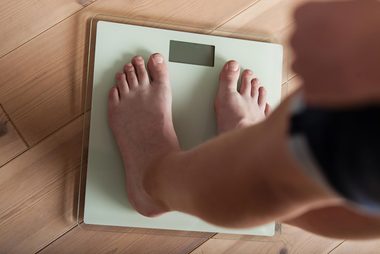
Your brain turns dieting into fat preservation
There are a lot of myths about weight loss out there, but one thing that’s proving undeniably true is that your brain hates dieting. In a new study of mice published in the online medical journal eLife, researchers discovered key brain cells actively prevent the body from burning fat when food is scarce. The researchers theorize we developed this trait when our ancestors needed to survive famines, but nowadays it just means that starving your self will actually turn on your body’s fat-preservation mode. “Our findings suggest that a group of neurons in the brain coordinate appetite and energy expenditure, and can turn a switch on and off to burn or spare calories depending on what’s available in the environment,” says says study leader Dr. Clémence Blouet from the Metabolic Research Laboratories at University of Cambridge, U.K., in a press release from Science Daily. “If food is available, they make us eat, and if food is scarce, they turn our body into saving mode and stop us from burning fat.”
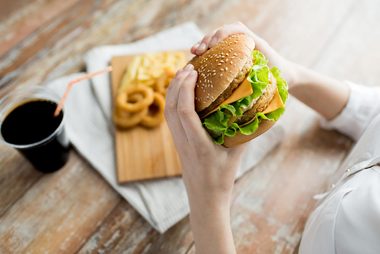
Being judgmental
When you think of a greasy cheeseburger, do you think of a negative or a positive connotation? What about a plain salad with barely any goodies? As we age and begin to give different meanings to various foods, we unintentionally—and often, mindlessly—begin labeling them. McMordie says removing the ‘good’ and the ‘bad’ behind these dishes will help change your focus. “Food has no morality, and eating is not black and white. Once food has no moral assignment, it has much less power over you,” she says. Don’t miss the 10 reasons you keep overeating.
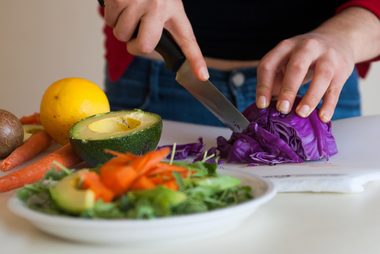
Denying pleasure
Part of the struggle with losing weight is what foods you pick to get there. If you’re haphazardly reaching for an apple because it’s good for you, but it gives you a belly ache, why not make the effort to peel a mango that you would enjoy more? McMordie says to consider eating an experience instead of a necessity. What she means is that by taking time to think about what you really want to eat and make it a mindful experience, then you are giving yourself an opportunity to check-in and tune-in to the healthy foods you actually like to make and consume, making you happier at meal times.
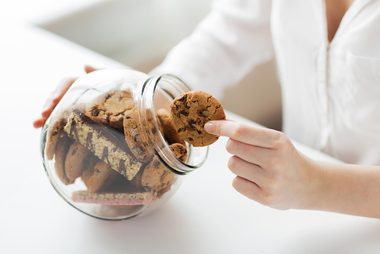
You fail to ask why
Before you put that cookie in your mouth, McMordie suggests asking why. Is it food that you’re desiring—or something else? “Ask yourself if food is even what you need. Often, people are craving emotional comfort when they eat without physical hunger. It is okay to eat for emotional reasons, such as cake at a birthday party, but you need to be able to recognize those cues and decide for yourself if food is what you want or need, or if something else will serve you better,” she says. These are the 7 things mindful eaters do at every meal.
Not tapping into gratitude
Gratitude can improve your health in numerous ways, but it’s hard to be grateful toward yourself. When an eating binge starts a guilt spiral, instead of giving yourself a hard time, registered dietitian Adina Pearson suggests a gentler approach. “Look at how amazing it is that our brain and body work to keep us alive,” she says. “It makes sense that if we create scarcity by dieting, those biological drives go into high gear to conserve our energy and to cause us to seek calorie-dense foods—or at least foods we’ve been avoiding. What if we simply stopped with the dieting madness and decided to care for our bodies and work with our appetite instead of fight it? I think we’d see much happier people in a variety of body shapes and sizes who maintained relatively stable weights and had better health.”

Pride won’t let you get help
If you can’t just wrap your head around the right way? Don’t be afraid to ask for help from someone who is prepared to handle whatever is blocking your progress. “Breaking the mental cycle of dieting and food fear is tough and takes time and practice. A dietitian specializing in intuitive eating and the non-diet approach can help you on your journey,” McMordie says. Learn more about their expert opinions with the 50 things your doctor wishes you knew about losing weight.

